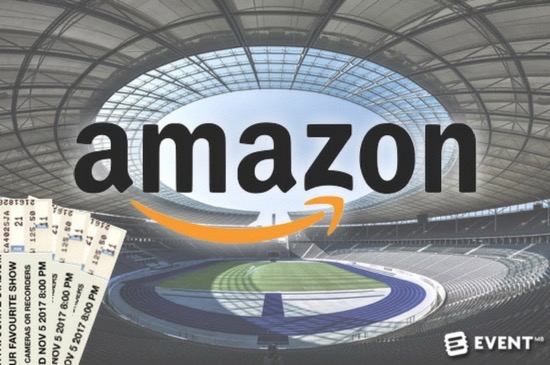Skift Take
Amazon wants a slice of the event ticketing market and there's only one firm standing in the way. Here we look at how that will affect the event industry.
Online retail giant Amazon is in talks with US venues in an attempt to take on the world of event ticketing. Ultimately, this means taking on its biggest player, Ticketmaster.
When one of the biggest companies in the world, headed up by the richest man in the world, steps into your space, it’s time to start paying attention. And if you’re the biggest player in that space, you’d better be ready because they are coming for you.
##abovethefold##
Why Event Ticketing?
There are thousands of event ticketing sites out there clamoring for the attention of eventprofs and attendees alike so it seems like a pretty tough nut to crack. However, the lion’s share of the $5 billion industry goes to one firm, Ticketmaster. A merger of Ticketmaster and LiveNation in 2009 and the swallowing up of a few other competitors have created a monopoly against which nobody can compete. That is, of course, unless someone like Amazon comes along with a bigger, better offer. However, it won’t be easy for Amazon, given that Live Nation owns several venues worldwide. It’s unlikely that Live Nation will allow Amazon special access to their venues due to a very real fear of losing market share, however, Amazon has a way of making things happen. As big and entrenched in the industry as it is, Ticketmaster will find very tough competition in Amazon, due to its massive captive audience.
This isn’t Amazon’s first foray into the world of ticketing. In 2015, Amazon started selling tickets for musicals in the UK, and this service has since expanded to offer concerts and other events. With two years’ experience selling tickets in the UK market, Amazon is far from being a complete industry novice.
Unlike its potential competitor(s) in event ticketing, Amazon can and do also offer a lot of technology that can be used to support events and improve the event experience.
How Amazon’s Entry Into Event Ticketing Will Affect The Industry
What we’d like to say here is that more competition will lead to a more competitive market, which will benefit everyone. However, in reality, that’s not what happens. For an example of how tech companies think in these situations, you only have to look at the likes of Apple. Instead of creating a more competitive marketplace, they create a more fragmented marketplace instead. In the case of Ticketmaster vs. Amazon, it’s likely that Ticketmaster will keep its proprietary [Live Nation] venues and Amazon will also keep its proprietary tech and content to itself. Each entity will also no doubt push for exclusivity with venues and events, allowing them to keep prices high and uncompetitive.
Should this be the case, not much will change from an attendee point of view. Most attendees don’t really have an affinity for an event ticketing service, they’re generally (rightly) more interested in the event than who is selling them the tickets. However, for eventprofs, things could get interesting if hosting an event at a particular venue means you are forced to use a particular ticketing service. As well as restricting where and how events sell tickets, it could also limit your options in terms of which event apps and services are used because integration with your go-to platform might not be available. This could mean that event planners may have to completely change their processes in order to use a particular venue.
Amazon is a Game Changer
Admittedly, not everything Amazon has ever done has been an instant world beater but they have definitely changed the game in many different areas. Here are some of Amazon’t greatest hits to date:
Online Bookstore
Thanks to Amazon, the way we buy and read books has changed forever. Amazon originally started out as an online bookstore, allowing people to order just about any book they wanted, straight to their door. It doesn’t seem so special now but in the late ’90s, when the worldwide web (WWW) was still pretty new, this was a big deal.
Amazon Kindle
Fast-forward to 2007 and Amazon changed reading again with the introduction of the Kindle. E-readers had already been around for almost a decade but hadn’t really caught on. Amazon founder, Jeff Bezos decided that Amazon should have the best E-reader available and through the combination of e-ink (a non-illuminated screen designed to have the look and feel of ink on paper) and the delivery of content straight to the device, the Kindle was – and still is – an instant hit. All Kindle devices integrate with Amazon’s Kindle Store content and the store currently has over five million e-books available in the United States.
General Retail
Building on the success of Amazon’s bookstore, Amazon soon became a place where you could buy almost everything. From books to bubble bath, just about anything you might want is now available via Amazon’s online storefront. Amazon is currently the third largest retailer in the world, quickly closing in on Wal-Mart and CVS.
Amazon Web Services (AWS)
In order to make all that online retail stuff happen, Amazon needed to build web services that could scale almost infinitely. It also needed to open some of their data up to partners, meaning it also had to be very accessible. This ultimately led to Amazon developing a cloud computing architecture that it could lease to other parties. AWS can take care of most hosting needs and due to its built-in scalability, has become a firm favorite for many a developer.
Video on Demand
Almost since its inception, Amazon, for many, has been the place to go for DVD and Blu Ray media and Prime Video now fulfills the same need but without the physical media. Users can purchase downloads of video content in much the same way as they would purchase a DVD or subscribe to the service to stream TV and movie content from numerous studios as well as content created by Amazon itself.
Amazon Studios
Amazon Studios is a TV production company set up to create video content for its Prime Video service.
Amazon Music
Like DVD and Blu Ray, Amazon also sells CDs via its online retail store but it doesn’t stop there. Just as it did with video, Amazon created a subscription-based online music streaming and download platform.
Amazon Alexa and Echo
Amazon Alexa has been big news recently, and it’s not surprising. Popularized by the Echo range of home personal assistants, the voice control/activation service puts a virtual personal assistant (like Siri) into a handy, home-friendly package. Like AWS, the nuts and bolts of the service are available for developers to use and integrate into their own products.
Whole Foods
Amazon recently acquired Whole Foods, staking its claim in health and well-being. With this, Amazon is also investing in food technology to create ready meals (pre-prepared food) that don’t require refrigeration or any special shipping needs.
Drone Deliveries
Okay, so, this hasn’t actually happened yet but every now and then, Amazon like to make it look like it’s about to. The theory goes that when you order from Amazon, your product could be dispatched and delivered immediately by a drone delivery service. Maybe one day.
Amazon Prime
Last but not least, we come to Amazon Prime. Prime is the subscription service that now underpins all of its retail services. As well as offering subscriptions to its on-demand and streaming services, Prime customers can also get preferential treatment with regards to delivery options, times, and free shipping. It’s likely that Prime will also bring benefits to attendees buying event tickets through the service.
In Conclusion
Killing off a monopoly is always a good thing but with Amazon entering the event ticketing space, the reality is that we’ll probably just end up with a fragmented duopoly, for now, at least.





